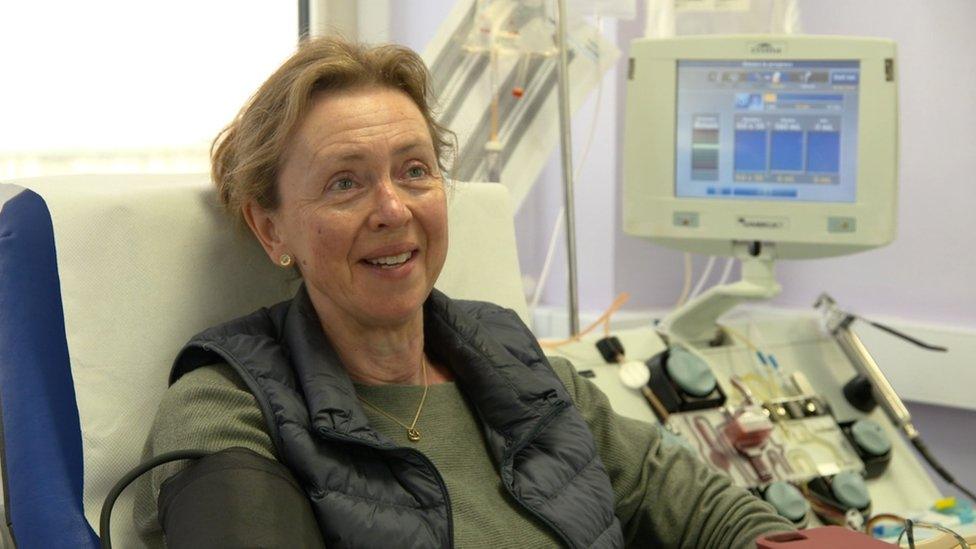Coronavirus: UK hospital trials new treatment drug
- Published
- comments
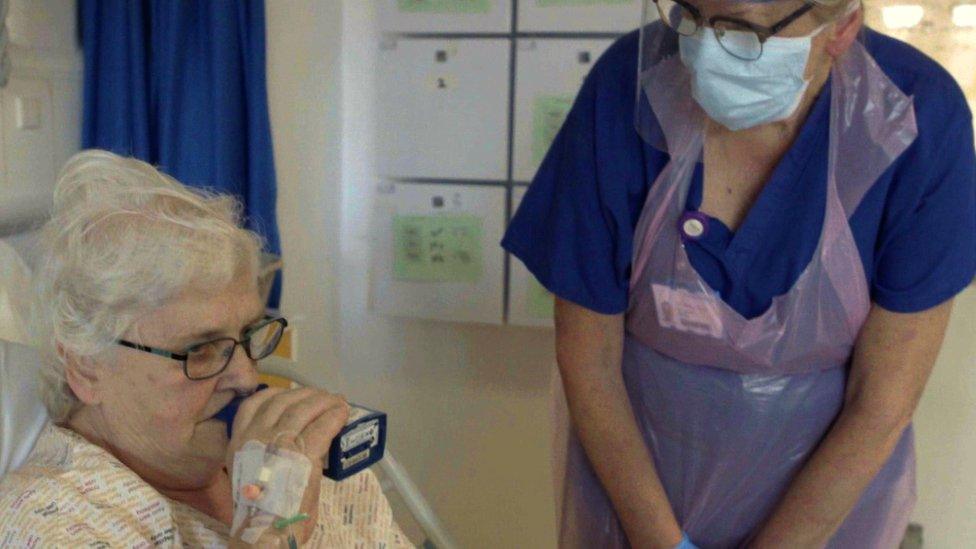
Kaye Flitney is one of 75 people enrolled in the clinical trial
A new drug developed by UK scientists to treat Covid-19 patients is being trialled at University Hospital Southampton.
Developed by UK bio-tech company Synairgen, it uses a protein called interferon beta, which our bodies produce when we get a viral infection.
Initial results from the trial are expected by the end of June.
There are currently few effective treatments for coronavirus with doctors relying on patients' immune systems.
What is the new drug?
Interferon beta is part of the body's first line of defence against viruses, warning it to expect a viral attack, explains Richard Marsden, chief executive of Southampton-based Synairgen.
He says the coronavirus seems to suppress its production as part of its strategy to evade our immune systems.
The drug is a special formulation of interferon beta delivered directly to the airways when the virus is there, with the hope that a direct dose of the protein will trigger a stronger anti-viral response even in patients whose immune systems are already weak.
Interferon beta is commonly used in the treatment of multiple sclerosis.
Synairgen has already shown its preparation can stimulate the immune response in the lungs of patients with asthma and other chronic lung conditions.
But we can only know whether it works for Covid-19 patients after it has been through a rigorous clinical trial.

The patient
Kaye Flitney is one of 75 people who have been enrolled in the clinical trial, filmed exclusively by BBC Panorama. It requires Covid-19 patients, like her, to inhale the drug via a nebuliser to bring it deep into the lungs.
Kaye, 67, struggles to sit up in her hospital bed and coughs as she puts the dispenser to her lips. She says when she first found out she had coronavirus her first thought was not for her own health.
"I was frightened because my husband has heart failure. It would kill him."
The 67-year-old, who was taken to hospital due to difficulty with her breathing, said taking the drug hasn't caused her much discomfort.
"You don't notice you're taking it 'til you're finished. It's not so bad. I could see myself taking it at home."

A SIMPLE GUIDE: How do I protect myself?
AVOIDING CONTACT: The rules on self-isolation and exercise
HOW A VIRUS SPREADS: An explanation
LOOK-UP TOOL: Check cases in your area
TESTING: Can I get tested for coronavirus?

How does the trial work?
The 75 volunteers involved so far have been recruited from some 10 hospitals around Britain. Half get the drug, half get what is known as a placebo - an inactive substance.
No-one involved in the trial knows which patients have been given which treatment until the trial is over.
"If you know it's a drug, your mind might have a bias," explains Sandy Aitken, the nurse administering the drug.
The hope is, it will show the patients getting the drug do much better than those that don't, says Professor Tom Wilkinson, of the University of Southampton.
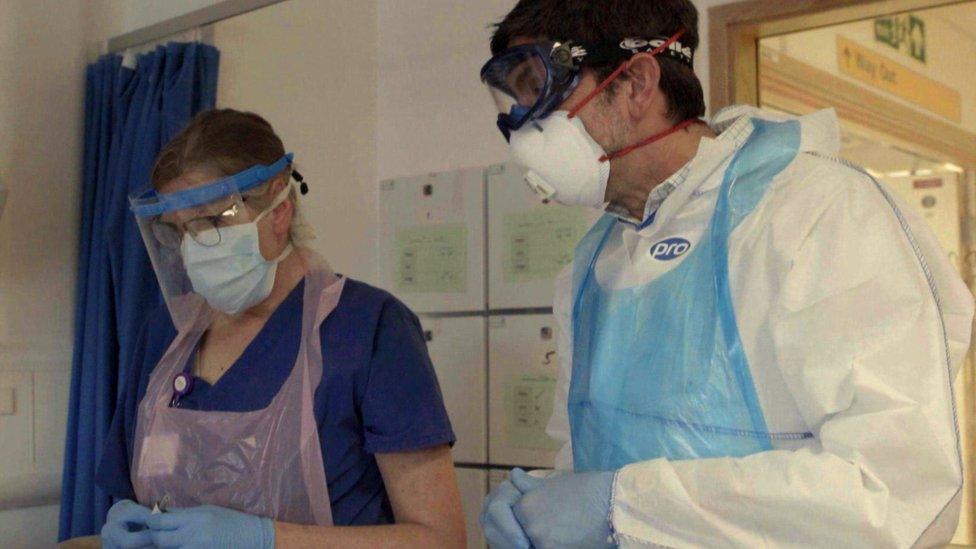
The BBC's Justin Rowlatt with nurse Sandy Aitken at a patient's bedside
Synairgen's drug trial is the template for a new fast-track clinical scheme that has just been set up by the government.
The Accord programme, as it is known, is designed to accelerate the development of new drugs for patients with Covid-19.
The first phase of the programme involves six other drugs.
More than 100 treatments are being explored worldwide and a drug called remdesivir, which was developed as an Ebola treatment, has generated particular excitement.
US officials have claimed there is "clear-cut" evidence it helps people recover from the coronavirus.
How far away could the UK treatment be?
Initial results from the interferon beta trial are expected by the end of June. But even if the drug does show promise, it will face further scrutiny before it can be used routinely on patients.
That could take months, although the government has said it will work as fast as possible.
If deemed effective, the drug and the nebulisers used to deliver it would then need to be manufactured in huge quantities.
Mr Marsden says he is already talking to suppliers around the world about whether it will be possible to start producing the drug as soon as the clinical trial is over.
However, he says it would still not be widely available until the end the year.
You can watch Panorama: When Will We Be Safe? at 19:30 BST on Monday, on BBC One and on the BBC iPlayer.
- Published3 May 2020
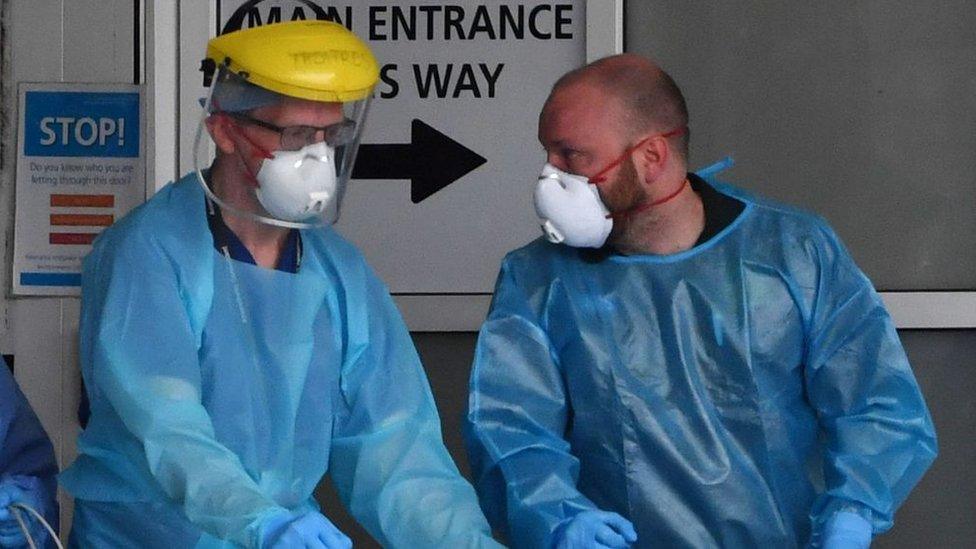
- Published1 May 2020
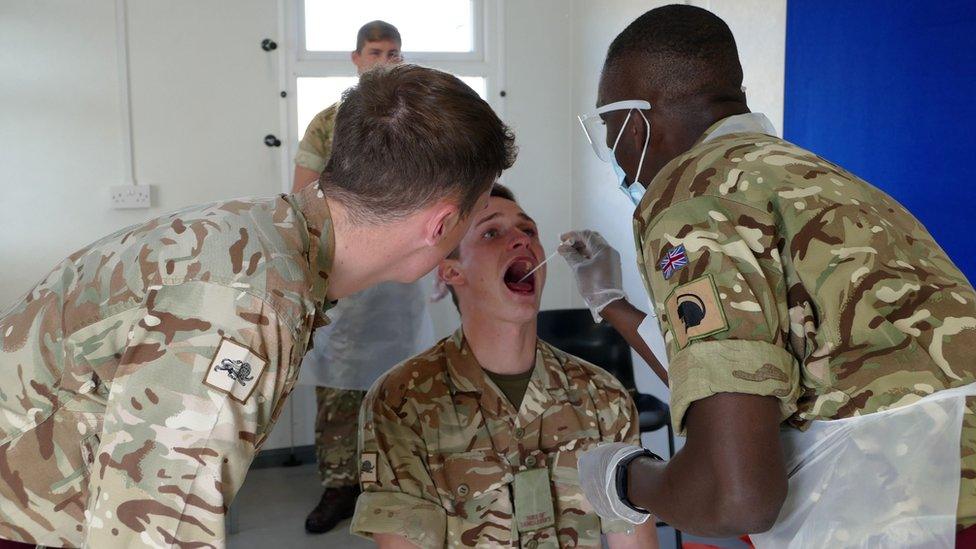
- Published2 May 2020
